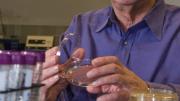Right Now
"Dissing Evolution"
Energy is the key to understanding human evolution—and to saving ourselves and our planet, says Daniel Lieberman.
Perseus in 3-D
New three-dimensional PDF technology allows Harvard astronomers—and you—to explore worlds hundreds of light-years away.
Our Psychotropic Lives
History professor Daniel Lord Smail explores the role of psychotropic mechanisms in human evolution and history.
Save Yourself
Harvard Business School’s Peter Tufano says simplifying savings-bond purchases for small savers will benefit citizens and government alike.
The Internet: Foe of Democracy?
The Internet, by allowing like-minded individuals to self-segregate, has had a polarizing effect on democracy, suggests Harvard Law School’s Cass Sunstein..
Laughing at Slavery
In Laughing Fit to Kill: Black Humor in the Fictions of Slavery, Glenda Carpio describes how slavery has provided a background and a source of raw material for African-American humor.
Rx for the Books
McKay professor of applied biology Ralph Mitchell and postdoctoral fellow Nick Konkol work with preservation librarians to develop a test that can detect damaging mold in books before it becomes visible.
by Paul Gleason
Retirement Engine Rebuilt
Skeptical of both defined-benefit and defined-contribution retirement plans, Harvard Business School professor Robert Merton proposes a hybrid, SmartNest, to overcome the shortcomings of each.
by Paul Gleason
The Fit Fat
Harvard Medical School’s Bruce Spiegelman studies brown fat, a little-known type of tissue with health-promoting potential.
Does Thinking Make It So?
In The Cure Within, historian of science Anne Harrington explores the medical history of the mind-body connection.





